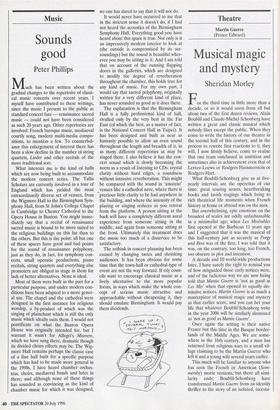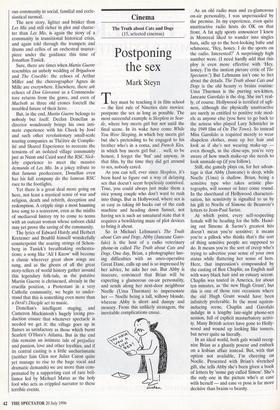Theatre
Martin Guerre (Prince Edward)
Musical magic and mystery
Sheridan Morley
For the third time in little more than a decade, or so it would seem from all but about two of the first dozen reviews, Main Boublil and Claude-Michel Schonberg have written a great and classic musical which nobody likes except the public. When they come to write the history of our theatre in the second half of this century, and in the process to rewrite first reactions to it, they will, I now firmly believe, come to realise that one team outclassed in ambition and sometimes also in achievement even that of Lerner-Loewe or Rodgers-Hammerstein or Rodgers-Hart.
What Boublil-Schonberg give us at five- yearly intervals are the operettas of our time: great soaring scores, heartbreaking books and lavish stagings which bring to rich theatrical life moments when French history at home or abroad was on the turn.
But overwhelming, epic emotions on the broadest of scales are oddly unfashionable in a minimalist age; when Les Miserables first opened at the Barbican 11 years ago and I suggested that it was the musical of this half-century just as securely as Porgy and Bess was of the first, I was told that it was, on the contrary, too long, too French, too obscure in plot and intention.
A decade and 50 world-wide productions later, I have surely the right to remind you of how misguided those early notices were, and of the ludicrous way we are now being told that Martin Guerre is 'not as good as Les Mis' when that opened to equally dis- missive notices. Martin Guerre is as much a masterpiece of musical magic and mystery as that earlier score, and you can bet your life that whatever Boublil-Schonberg write in the year 2006 will be similarly dismissed as 'not as good as Martin Guerre'.
Once again the setting is their native France but this time in the Basque border- lands of the Middle Ages. We are some- where in the 16th century, and a man has returned from religious wars to a small vil- lage claiming to be the Martin Guerre who left it and a young wife several years earlier.
This much will be familiar to anyone who has seen the French or American (Som- mersby) movie versions,- but there all simi- larity ends; Boublil-Schonberg have transformed Martin Guerre from an identity thriller to the story of an isolated, incestu-
ous community in social, familial and eccle- siastical turmoil.
The new story, lighter and brisker than Les Mis and still richer in plot and charac- ter than Les Mis, is again the story of a community in transitional historical crisis, and again told through the trumpets and drums and cellos of an orchestral master- piece under the guidance this time of Jonathan Tunick.
Sure, there are times when Martin Grime resembles an unholy wedding of Brigadoon and The Crucible: the echoes of Arthur Miller and the choreographer' Agnes de Mille are everywhere. Elsewhere, there are echoes of Don Giovanni as a Commenda- tore returns from the grave, and even of Macbeth as three old crones foretell the troubled future of their hero.
But, in the end, Martin Guerre belongs to nobody but itself. Declan Donellan as director wondrously brings his own inti- mate experience with his Cheek by Jowl and such other revolutionary small-scale touring companies as Theatre de Compile- de and Shared Experience to recreate the tensions of an isolated village community just as Nunn and Caird used the RSC Nick- leby experience to meet the massive demands of Les Mis. In a jokey tribute to that famous predecessor, Donellan even has his full company do the famous RSC race to the footlights.
Yet there is a great deal more going on here, not least a mystical sense of war and religion, death and rebirth, deception and redemption. A cripple sings a most haunting love song to a scarecrow, even as the misfits of mediaeval history try to come to terms with an outcast woman whose unborn child may yet prove the saving of the community.
The lyrics of Edward Hardy and Herbert Kretzmer and Boublil himself wonderfully counterpoint the soaring strings of Schon- berg in Tunick's breathtaking orchestra- tions; a song like 'All I Know' will become a classic wherever great show songs are sung, and as the ghosts of all the great story-tellers of world history gather around this legendary folk-tale, as the putative Martin Guerre is christened, already in the crucifix position, a Protestant in a very Catholic community, we begin to under- stand that this is something even more than a Devil's Disciple set to music.
Donellan's intelligent staging, and Cameron Mackintosh's hugely loving pro- duction ensure that whenever spectacle is needed we get it: the village goes up in flames as satisfactory as those which burnt Scarlett O'Hara's Atlanta. But in the end this remains an intimate tale of prejudice and passion, love and other loyalties, and if its central casting is a little uncharismatic (neither lain Glen nor Juliet Caton quite yet manage to rise to the huge vocal and dramatic demands) we are more than com- pensated by a supporting cast of rare bril- liance led by Michael Matus as the holy fool who acts as crippled narrator to these terrible events.



























































 Previous page
Previous page